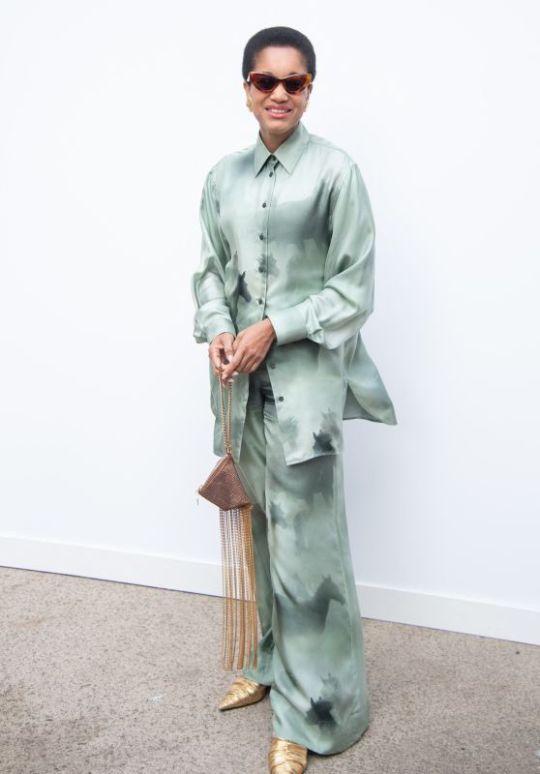#Yasmin Zahran
Explore tagged Tumblr posts
Text





Chic looks from the Stella McCartney SS25 Show during Paris Fashion Week
#india amarteifio#fashion look#fashion show#stella mccartney#designer brand#denim on denim#matching set#silk#stylish#appearence#womenswear#spring summer 2024#paris fashion week#paris#ethereal#glamour#zita d'hauteville#elegance#sophsticated#tamu mcphersons#blogger#influencer#bold statement#yasmin zahran#british#actress#internet personality#italian#socialite#gaia gozzi
1 note
·
View note
Note
The name Jasmine?
Most names that are also English words aren't very interesting, etymologically-speaking, but Jasmine, thankfully, is not just an English word. The flower name comes to us from French (jessemin) ultimately from Persian (yasaman) and Arabic (yasamin). It's a very old word found in some of the earliest Arabic texts.
The English name of the flower has been around since the 16th century, but the name only came into common usage in the US in the 1970s, and then it was primarily used by Black Americans. If you're wondering if Disney's Aladdin had anything to do with its rise to common usage, it's actually the case that princess Jasmine was given an already-popular name! Jasmine hit the top 30 in 1990, two years before Aladdin came out, and stayed in the 20-30 range until 2006. It's on a very gentle decline now, still at a healthy #190.
The tricky part is determining the extent to which the name existed in various languages before and after the popularity of Jasmine in the Anglosphere. Few combined databases include any records from Iran or various Arabic-speaking countries, and the US is the only country with consistent, searchable data pre-1950. Before then, we tend to look for notable people as indicators of a name's commonality, which is further complicated by the fact that this is a feminine name and women were given fewer opportunities to become notable in ye olden dayes.
Thankfully, it seems men in the Arab world did use variants of this name at one point. Jazmin Hiaya, probably of Almohad descent in Northern Africa, was a military leader in Al-Andalus (modern Spain) in the late 10th and early 11th centuries. It's harder to create continuity between this early example, though, and the more modern female name.
The next earliest notable I can find is Yasmin Zahran, 1933, Palestinian archeologist, well before the Jasmine craze. Others include Yasmeen Lari, 1941, Pakistani architect, and Yasmine Zaki Shahab, 1946, Indonesian anthropologist. I was also able to find a few incomplete marriage church records for Iranian women named Yasmin born as early as 1870. All of this indicates that the Arabic and Persian feminine name significantly predates the English.
There are about 20 other languages, at least, that have their own versions of this name, which may be influenced by other names or come from the flower itself. There are a few notable Serbian Jasminas born in the 1960s, and a popular 1962 Greek song that used the name, so the name in that region clearly reached popularity on its own. Other than that, again, it's hard to tell.
Our final piece of the puzzle: why did the English Jasmine take off in the first place? I can't say with any level of confidence. I found no notables born in the right age range to inspire a surge that started when it did. If I had to venture a guess, I would point toward its prominence in the Black community along with the rise of Black Muslim groups like the Nation of Islam and Moorish Science Temple. NOI had 20,000 members by the '60s and had attracted prominent figures like Malcolm X and Muhammed Ali. It would make sense, in this context, for Jasmine to become popular specifically because of its Arabic roots.
2 notes
·
View notes
Text
If You Want to Look for the Truth, Examine the Lie.

I cannot say to you —your people shall be my people Your gods shall be my own
I try to hide from you, no —from myself
The horror that in their heyday
Your people sold my people
Your people gave away my land, my earth, my blood
Your kin bartered my heritage, my future
Can you forgive me, if I tell you
How often you who are so close to me
Seem alien, of the blood of those who sold my mother’s grave. (72)
—Yasmin Zahran, from A Beggar at Dasmascus Gate
This semester, I’m teaching a college course called “The Novel of the Global City” in a moment in which the concept of globality is increasingly associated with conflict and fragmentation. In class, we talk about populism, nativism, and the surge of hard ideological lines between peoples and places in periods of historical crisis. Yet, my students live in Queens, New York, officially the world’s most diverse place. They resist my portrait of the times. They believe adamantly in the possibility of a safe, multicultural coexistence. We turn together to literature to better understand the pressures we face, and perhaps for glimmers of hope.
This week, we are reading Teju Cole’s Open City. Cole’s protagonist, Julius, is an erudite Nigerian German psychiatrist on an intellectual quest for identity. On his journey, he finds himself in Brussels, deep in conversation with a multilingual Moroccan, Farouq, who works at a calling center, and happens to be a political philosopher. Cole deftly inserts Farouq into the narrative as a mouthpiece for views infrequently heard in elite intellectual circles in the Euro-U.S. empire, and makes the reader explicitly aware. Farouq says,
There’s always the expectation that the victimized Other is the one that covers the distance, that has the noble ideas; I disagree with this expectation. It’s an expectation that works sometimes…but only if your enemy is not a psychopath. You need an enemy with a capacity for shame.
Farouq and his friend Khalil speak to Julius about the power of portrayal, how Middle Eastern dictators are only understood as such by the U.S. when they fly in the face of U.S. interests. They explain how the plight of Palestine can therefore only be read as fundamentalist. They claim that Hamas and Hezbollah, though their actions cannot be condoned, are doing the work of resistance against U.S.-Israeli imperialism. Julius, with whom presumably U.S.-American readers are invited to align themselves, avoids the lure of violence by “having no causes, by being magnificently isolated from loyalties”, and so performs the astonishment Cole expects of the reader. However, Julius’ internal monologue betrays an awareness that, as the American, he cannot dismiss Farouq outright, nor can he express agreement.
…I was pretending to feel an outrage greater than I actually felt. In the game, if it was a game, I was meant to be the outraged American, though what I felt more sorrow and less anger. Anger, and the semiserious use of a word like extremist, was easier to handle than sorrow.
I could not help but think of Farouq and Julius while reading Yasmin Zahran’s novel, A Beggar at Dasmascus Gate, published by The Post-Apollo Press in 1995. An archeologist in Petra discovers the abandoned letters written between a mysterious Arab woman writer, Rayya, and Alex, her lover, an equally mysterious English architect who seemingly has no project. Obsessed, the archeologist loses himself in their story. Their love is passionate and poetic, but their philosophical and political commitments drive a toxic wedge between them. Rayya is described as a near-sorceress, a woman with a strange power over people. She is also deeply invested in the liberation of Palestine. Alex feels emotionally boxed out of her worlds due to her resistance to Western rationalism. He imposes upon her his supposedly more moderate political views. He lobs at her jealous accusations of a pan-Arab zealotry or “professional Arabism”, and of being lost in a world of intuitive knowledges and fantasies that are below her intellectual stature. We watch as their political battles and histories demarcate the limits of intimacy. Romance devolves into games of manipulation, making and breaking illusions of safety, warping the potential for shared human connection into a mirror of political opposition.
Zahran side-steps cynicism by revealing that they are more than a writer and an architect. Neither are in Petra simply due to their adventurous natures. Both come with agendas and skills, and watch each other closely to gather information. Zahran opens the third part of the novel with the following: “If you want to look for the truth, examine the lie.” While increasingly enraged by Rayya’s insistence on Palestinian liberation, Alex has a dream in which a professor says to him:
'...If that dream of Arab unity is one day realized, it will become an immediate threat to our way of life and our standard of living. Just remember that raw materials will become expensive and scarce. Industrialization and improved agriculture will close the Arab World as a market for Western goods, especially British products. Strategically, we will be at their mercy, for they are at the crossroads of a shrinking world.' ...'We must buy time against this projected unification, which threatens our very existence, and the group of people that you must watch, split, harass and if necessary destroy are the Palestinians, for they, more than any other Arab people, need this unity for survival. Strike at Palestinians and you shatter the core of Arab unity. Please note that every Western power is aiming at the same target by different means.'...'Do not let us deceive ourselves: Arab unification is inevitable; all we can do is to delay its course, and it is here that our interests converge with those of the Israelis, for they are also buying time.'
In the recesses of the rationalist mind, the accusations of extremity know themselves to be manifestations of hegemony, a normalization of the longue durée of colonial violence and U.S. and European supremacy. Alex can never say outright that he recognizes Rayya’s plight, and eventually begins to lose his grip. Zahran pushes Alex aside as the British spy who bungled his mission, and allows Rayya to blossom, finally revealed as a spy for the PLO. However, for Rayya’s ideas to exist, she must be a character in a frame story, an occasionally unintelligible fantasist, held like Farouq at enough of a distance to express dangerous sentiments. A woman, she must also be beautiful, enticing. Two decades apart, Rayya and Farouq, or Zahran and Cole, must choose carefully when and whether to have the noble ideas of the victimized other, how to negotiate between self-victimization and accusations of extremism.
In a world where our enemies, whomever we interpret our enemies to be, seem to be indeed psychopaths with no capacity for shame, to whom do we turn to salvage my students’ dream of harmonious cohabitation? How do we find solutions when we are unable untangle whose work is the work of resistance, and whose is the work of terror? What strategies are we forced to employ over and over again to give voice, even covertly, to the oppressed?
-Ashna Ali
#reading and healing#A Beggar at Dasmascus Gate#Yasmin Zahran#Teju Cole#Open City#Litmus team#Ashna Ali
1 note
·
View note